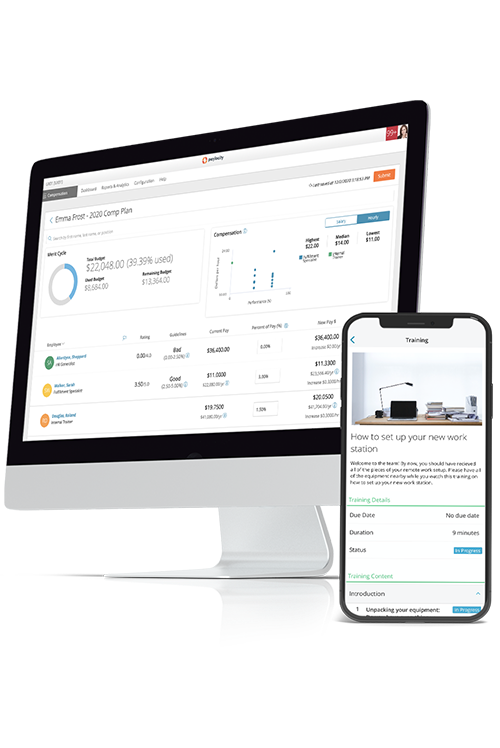resources
How to Hire Remote Employees
May 04, 2023
Hiring remote employees can help widen your talent pool and create new opportunities for your company. Let’s examine the remote hire process and discuss tips for selecting the most suitable candidates.
Blog Post

Looking to hire. Location: Anywhere.
Since the COVID-19 pandemic, many companies have left behind the expectations of location-based, office workplaces and are moving toward fully remote or hybrid models.
Our working culture has changed forever, and it happened fast.
Hiring remotely can be advantageous. As an employer, recruiting remote workers means geography is no longer a factor. You can seek out potential candidates globally, and in some cases, you’ll be able to provide your customers with round-the-clock service.
Don’t get us wrong — the remote hiring process has its challenges. But if you're smart and intentional, you’ll find yourself reaping the many benefits it offers.
What is a Remote Job?
A remote job is a type of employment where an individual works outside of a traditional in-person environment.
Remote workers perform their duties from a location of their choosing instead of commuting to a physical workplace. This is often their home, but as long as the communication tools such as email, phone, and video conferencing are in place, they can work from almost anywhere.
A wide range of companies in differing industries offer full-time and part-time remote jobs. It’s ideal for people who want to eliminate the daily commute, work for a company they admire that’s not where they’re located, or accommodate personal circumstances.
Benefits of Hiring Remote Employees
There are many advantages to remote hiring:
- Expanded talent pool. Compared to traditional hiring, remote hiring means you can pick from the best of the bunch — on a global scale. The result is adding highly skilled and experienced remote workers to your payroll.
- Reduced overhead. Remote hiring can result in significant cost reductions for your business. With fewer people to accommodate in a physical location, you can save money on office space, utilities, commuting expenses, and other overhead costs associated with maintaining an office.
- Boosted productivity rates. Fewer distractions and the ability to create a personalized work environment often means higher productivity levels. Additionally, the flexibility of a remote workforce enables your employees to work during their most productive hours for even more efficiency.
- Increased employee satisfaction and retention. Employees with the flexibility to work remotely are often more engaged, motivated, and loyal to their employers.
- Business continuity factors. Remote hiring can provide business continuity, as employees can work remotely during unforeseen circumstances like natural disasters, pandemics, or other disruptions that may hinder on-site work.
- Elevated diversity, equity, inclusion, and accessibility. Remote hiring provides opportunities for individuals from different backgrounds, demographics, and locations to join the workforce. This can lead to a more diverse and inclusive workplace and bring in a variety of perspectives and ideas.
How to Hire a Remote Employee
A successful remote hire isn’t that different than hiring for an in-person role. There are just a few nuances. Here’s how to source a remote employee:
1. Create a job description and posting
Create a job posting that includes a detailed job description, requirements, and instructions on how to apply, along with the deadline. Be specific about the remote nature of the position and your company’s remote work expectations.
Emphasize the advantages of remote work, like flexibility, work-life balance, and location independence. Explain how your company supports remote work and any tools or technology you use for remote collaboration.
Pro Tip: Consider Where You Advertise Your Job
Generic job boards might not deliver the candidates you want. Targeted job boards or specialized websites catering to remote work can be more effective, as they’ll help you find candidates specifically interested in remote work.
Many remote employees actively participate in online communities, social media groups, and forums related to remote working. Explore these to find qualified candidates who may already have a solid remote work setup in place.
Join discussions on these platforms to position yourself as a remote-friendly employer and to attract potential candidates.
2. Screen applications
Review the resumes and applications from potential candidates to evaluate their qualifications, skills, and experience. Look for qualities that align with both the role and your company's overall culture.
A candidate might be the perfect fit if they plan to work in your office, though someone with a different skill set might be better suited for remote work.
Be mindful of the following qualities:
- Self-motivated. Remote workers need to be able to complete tasks independently without constant manager supervision.
- Strong communication skills, especially via email, video, and messaging software.
- Well-organized. Virtual employees need to be able to manage their time effectively and set boundaries between work and personal life.
- Comfortable using technology to complete work and communicate.
- Flexibility and adaptability. Remote employees might need to work odd hours based on team availability and handle unexpected challenges, like technical issues.
After review, go ahead and shortlist the candidates who meet the job requirements.
3. Conduct remote interviews
Conduct virtual interviews with your shortlisted candidates. Ask specific questions related to remote work experience, communication skills, and their ability to work independently with a strong work ethic.
During the remote interviews, discuss expectations about communication. It's important to carefully consider how you communicate and establish clear expectations.
If you're working across different time zones, this may involve remote workers checking in via messaging tools at the end of their workday for your team to review first thing in the morning. Be specific these expectations so your team can effectively collaborate and communicate with all remote hires.
Consider involving HR, managers, colleagues, and executives to build out a thorough and comprehensive interview process. Each interviewer will be on the lookout for different qualities, strengths, and weaknesses.
4. Extend the offer letter
Once you've identified the most qualified candidate, much like in an in-person hire, it's time to send out your offer letter with the compensation and role details. The right HR software with integrated applicant tracking and recruiting tools will make it easy to quickly communicate with your candidate.
It's important to avoid resting on your laurels. In a competitive talent market, speed can be a differentiator in appealing to star talent.
Remote Interview Process
Sample Remote Interview Questions
During the remote interview, you’ll want to optimize your time to find the best applicants.
The following questions help you determine how well potential workers handle management in a remote world setting:
- How much experience do you have working remotely?
- Have you previously worked on similar projects in a remote setting?
- What challenges have you encountered while working remotely, and how do you overcome them?
- Describe your communication style in a remote work environment.
- How do you approach asking for help when you need it?
- How do you hold yourself and your remote teammates accountable?
- Share an example of a remote project where you faced a communication issue and how you resolved it.
- What resources or support do you need to be successful in a remote work environment?
- How do you manage your time and stay productive while working remotely?
- How do you handle potential distractions or isolation that may come with remote work?
- How do you stay updated and informed about company news, updates, and changes while working remotely?
- How do you handle conflicting priorities or deadlines in a remote work setting?
Factors to Consider When Hiring Virtual Employees
State Work Regulations
If your employees live in a different state or territory, you must follow local employment regulations. You'll need to be aware of differing minimum wage rates, payroll taxes, time-off policies, and more to stay compliant. You’ll also need to ensure employees are paying state taxes on their wages for the state they live in, not the state your corporate headquarters resides.
If you don't comply with these regulations, your organization could be subject to penalties. So, it's definitely worth taking the time to make sure you're doing things by the book.
If you’re hiring remote employees across multiple states or localities, it can be tough to stay up to date on all the different and changing employment regulations. Robust HR software can help you keep track of all the applicable laws based on where your workforce is based, so you can stay compliant without having to do all the legwork yourself.
Read More: HR Compliance 101: Fundamentals for HR Professionals
Global Hiring
If you’re looking to add international employees to your staff, ensure you’re set up to hire and run payroll in other countries.
Global hiring means setting up in-country bank accounts to comply with payroll funding regulations. In addition, you must ensure compliance with labor requirements.
It’s wise to look into global payroll solutions to help manage the complexities that come with employing international employees. A platform that offers customer support in the form of managing foreign currencies, time zones, and compliance requirements is vital.
Availability and Time Zones
Consider a remote employees’ global location in relation to your team’s working hours. Is there enough overlap in working hours to make teamwork work?
If there's large gap, clearly communicate your expectations regarding communication and response times during those hours when the remote employee is working while everyone else is sleeping.
Maybe you schedule sync meetings at the end of their day and beginning of yours — or vice versa. Or if there's no overlap at all, is there a chat channel where they can sign off with a summary of their day?
Onboarding and Training
Be especially intentional about how you onboard and train remote staff. Simply sticking them on a conference call in a room full of in-person workers may make them feel isolated and unengaged. Consider HR software with baked-in employee communication and development tools to help overcome the digital divide.
Don't forget the logistical necessities. Make sure your remote employees have the tools they need to work from anywhere. Give them instructions on how to set up and use the tech, including communication tools and project management software. Provide guidance on filing IT tickets in case they encounter issues.
Read More: Employee Onboarding: Ultimate Guide to New Hire Success
Hiring the Best In-Person and Remote Talent with Paylocity
Hiring the best in-person and remote talent begins with Paylocity.
Our connected HR software simplifies processes, breaks down barriers, and creates purpose for your business. Leverage our talent management software to automate the recruiting and onboarding experience, ensure fair pay, and offer plentiful opportunities for career development.
Explore intuitive resources like video tools, two-way email and texting, employee templates, and digital contract signatures to streamline the talent acquisition processes — making hiring in-person or remote talent a breeze.
Request a demo today to learn more about how Paylocity can help you source star talent, wherever they’re located.

The Tools You Need to Attract and Retain
Embed employee experience features from recruiting, onboarding, and beyond with tools built for the modern workforce. Kick off day one with a welcome message using video. Connect your employees with collaboration tools and peer groups. Develop your team with relevant and interesting training. Keep the conversation going with surveys. And do it all while automating and collecting data to proactively make improvements.


